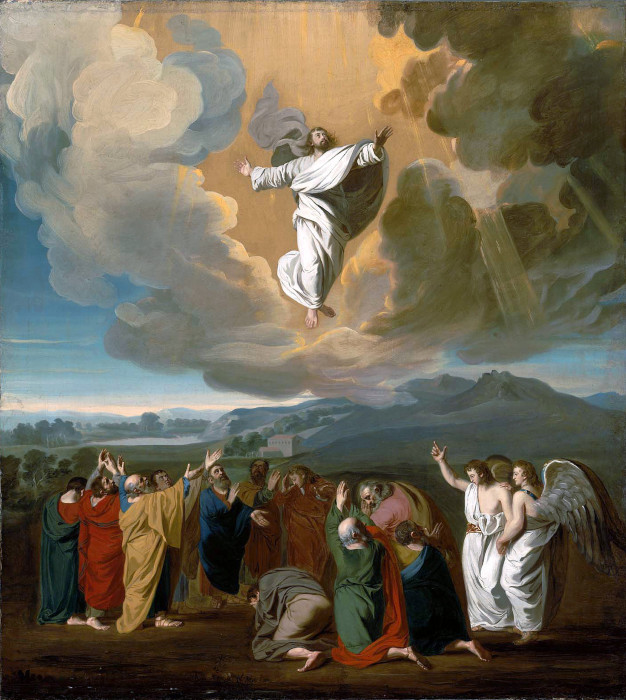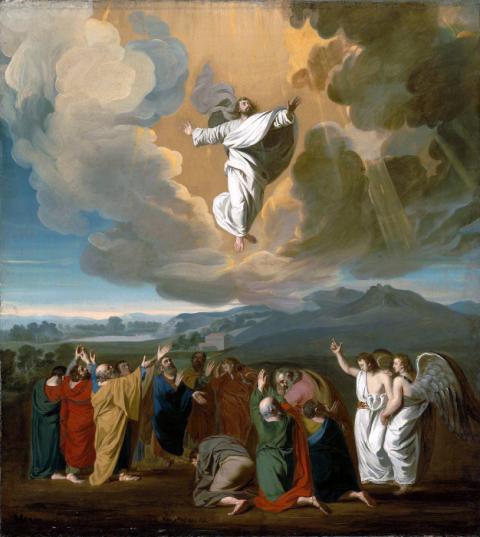
Jesus' ascension to Heaven depicted by John Singleton Copley in “Ascension” (1775). Image courtesy of Creative Commons

Jesus' ascension to Heaven depicted by John Singleton Copley in “Ascension” (1775). Image courtesy of Creative Commons
When you create a password at your bank, it asks you some authentication questions. My favorite is, "What historical person would you most like to meet?" I always wonder how many people say "Jesus."
On May 21, we celebrate the Ascension, the day Jesus left the Earth. I think a lot of us would like to have him back. But Jesus did leave and gave us the Spirit. Was that a fair trade?
If you could choose between having Jesus present today or having the Spirit, which would you choose? I think that for most Christians, it would be no contest. Most of us would give up a lifetime with the Spirit for five minutes with Jesus. We want Jesus; we can skip the Spirit.
And yet if that is what we believe, then we really did not understand the Gospels; we really did not understand Jesus.
The feast of the Ascension (May 21) celebrates letting go of the physical Jesus and preparing for the arrival of the Spirit on Pentecost (May 31). We don't want to do this any more than the apostles did when, at the Last Supper in John's Gospel, Jesus tells them that he must go. He must go so that he can send the Spirit.
Jesus tells his disciples in chapter 16 of John, "It is better for you that I go," because otherwise, the Spirit will not come. "But if I go, I will send him to you."
The disciples reply, in essence, "Forget the Spirit, we want you to stick around."
I think our response today would be the same. But Jesus says that it is better for us if we have the Spirit. Why is that?
I think it's because no matter how close we get to him, Jesus is always external, whereas the Spirit is within us. To put it another way, it's the choice between having Jesus or being Jesus.
It is the Spirit that makes us Jesus, makes us the body of Christ. It is the Spirit that gives us life and fills us with love. That is why Jesus must leave so that he can send the Spirit. It is not enough for us to be with Jesus; we must become Jesus, and we can only do that with the power of the Spirit.
Most Catholics get nervous when they hear charismatics or evangelicals talk about being filled with the Holy Spirit. At some point in our lives, we may have had a spiritual experience where we felt the presence of God, but most of the time we plod through our pedestrian spiritual lives with no fireworks.
I think our problem is that we don't know how to recognize the Spirit's presence in our lives. I think we experience the Spirit's presence not just at special moments, but every day of our lives. We just don't recognize it. If we truly believe that God is Love, as the Scriptures tell us, then every time we experience love, we experience the Spirit.
Every child who has a loving parent, has experienced the Spirit. The faithful love we experience from friends and spouses is an experience of the Spirit. The innocent and trusting love of children is a sign of the Spirit. Whenever we feel impelled to love, it is not just hormones; it is the power of the Spirit.
People who risk their lives to care for COVID-19 patients are filled with the Spirit. Those who dedicate their lives to justice and peace or to protecting Mother Earth are impelled by the Spirit.
In his 2016 apostolic exhortation, Amoris Latitia, Pope Francis said that he saw the presence of the Spirit in the women's movement when it worked for equality and the rights of women.
You might say, "This doesn't sound like the Spirit; this is all very human." I would argue that what is most human, what is most truly human in us, is the presence of the Spirit. The Spirit is present in everyone, calling us to be more than we ever thought we could be. Only the Spirit gives us the power to love unselfishly, to sacrifice ourselves for another, to commit ourselves with fidelity in good times and in bad, to put justice above our own advantage.
There is a second reason Jesus must leave: He must be transformed into the cosmic Christ.
In Luke's cosmology, heaven is in the sky. Our knowledge of astronomy and evolution gives us a different perspective. The ascension celebrates Jesus becoming the cosmic Christ who is related not just to Earth and humanity, but to the Universe and all that lives in it. In this sense, the Christ is bigger than Jesus, just as the Universe is bigger than our Earth. The ascended Jesus becomes the cosmic Christ sitting at the right hand of the Father.
In his first Easter homily, Pope Benedict said that the resurrection is the next step in human evolution. We help the world evolve when we unite ourselves with the resurrected Christ by becoming more loving. The Ascension reminds us that the Christ with whom we are united is the cosmic Christ who sits at the right hand of the Creator of the Universe.
As we celebrate the Ascension, we listen to the words of Jesus, but with ears opened by the Spirit. By the power of the Spirit we are united with Christ and with one another as one body. This Christ is not just the Jesus who walked the earth, but the cosmic Christ.
By the power of the Spirit, we join Christ and all creation in giving thanks to our God and Father. And when we break bread, the Spirit opens our eyes to see the Christ in our midst. As we celebrate the Ascension and Pentecost, we pray, "Come Holy Spirit, fill the hearts of your faithful."
[Jesuit Fr. Thomas Reese is a columnist for Religion News Service and author of Inside the Vatican: The Politics and Organization of the Catholic Church.]
Editor's note: You can sign up to receive an email every time a new Signs of the Times column is posted. Sign up here.
Advertisement




